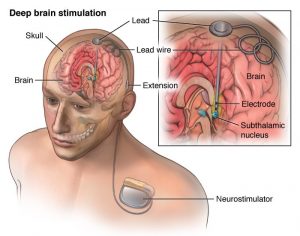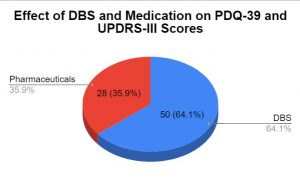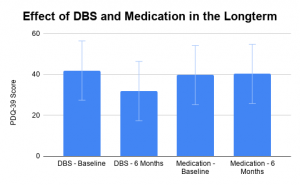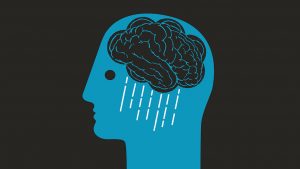Deep Brain Stimulation (DBS) is a form of neurological stimulation and is used as a form of treatment for those suffering from Parkinson’s Diesease (PD). PD is a neurodegenerative brain disorder which hinders dopaminergic neurons, resulting in impaired mobility. DBS involves a surgical process of implanting a small battery operated device and a electrodes into the brain.

Figure 1 – Deep Brain Stimulation Retrieved from – GAPS
This study published in August 2006 highlights the efficacy of DBS. 156 patients were randomly paired (78 pairs) and were subjected to different treatments. One was subjected to treatment from pharmaceuticals and the other underwent DBS. To test the efficacy of DBS, the patients’ quality of life was assessed using the Parkinson’s Disease Questionaire (PDQ-39). Additionally, numerous symptoms associated with PD were measured using the Unified Parkinson’s Disease Rating Scale, part III (UPDRS-III).
Efficacy of DBS
Out of the 78 pairs of patients, the patient who underwent DBS in 50 of the pairs saw an improvement in their PDQ-39 and UPDRS-III scores compared to their partner who was only provided with pharmaceutical drugs.

Figure 2 – How DBS and Pharmaceuticals affected the PDQ-39 and UPDRS-III scores in patients immediately after treatment. In 50 of the 78 pairs, those who underwent DBS showed improvement in their scores compared to their partners who took medication. Data from Deuschl et al.
Furthermore, the patients were assessed again in six months. Those who underwent DBS saw a 25% increase (a lower score) to their PDQ-39 score, while there we no significant changes to those who took medication.

Figure 3 – PDQ-39 Scores immediately after treatment (baseline), and 6 months after treatment. Error Bars represent standard deviation. Data adapted from Table 3 of Deuschl et al.
Benefit of DBS Compared to Medication on Treating Depression
There are additional benefits of DBS on other aspects of PD. This study published in March of 2005 highlights how DBS is able to treat depression, which is a symptom associated with PD. Patients who were treated by DBS noted a decrease in depression-like symptoms 1 month after treatment, and up to 1 year. In contrast, medication can only treat depression in the short-term.

Figure 4 – A visual interpretation of depression Retrieved from – ConsumerReport
So why is DBS better than Prescription Medication?
The results of both studies indicate that DBS is capable to treating PD with a higher efficacy compared to medication. Additionally, medication is kept constant and can be used to treat one specific issue. In contrast, the strength of DBS can be altered (stronger/weaker pulses) to treat different symptoms that may arise. Consequently, DBS results in long-term benefits, while medication is only able to provide short-term benefits.
-Jackson Kuan
